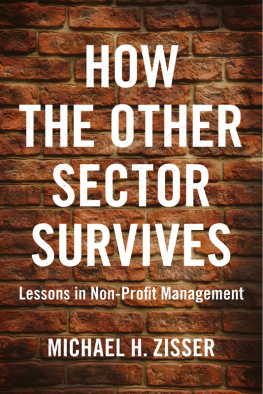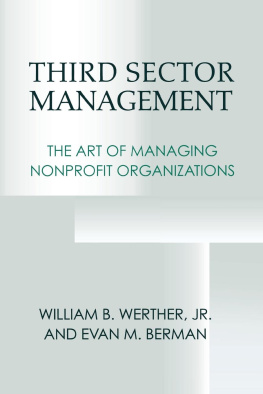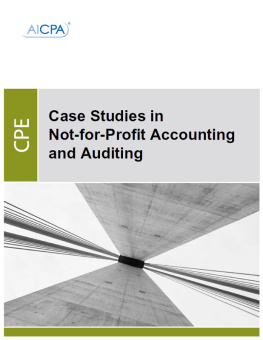

ISBN: 9781483502403
PREFACE
The non-profit sector represents a significant proportion of the United States economy, and yet there is a puzzling absence of informed literature or case studies focused on the management leadership skills necessary to make this sector a success. The vacuum has been evident to me in my professorial role and in my professional life, exacerbated by the fact that most published materials have been written by academicians or consultants with little or no practical experience. This book is an attempt to fill a small portion of that vacuum.
For more than twenty five years, I have served as Executive Director now Chief Executive Officer of University Settlement, the oldest settlement house in the country which celebrated its 125th birthday in 2011. When I assumed this position in 1988, the Settlement was a small but proud organization serving the Lower East Side community of New York City. We have grown substantially since that time by all measures scale, staff size, annual budget, number of sites, geographical reach - respectful of our history but also committed to taking programmatic and organizational risks in meeting the ever changing needs of the community and the City. University Settlements significant success in recent years has substantiated the strength and effectiveness not just of this organization, but of the larger settlement house movement. One of our most significant accomplishments was the acquisition of The Door A Center for Alternatives, one of the largest and most respected youth development agencies in the country. Non-profit mergers and acquisitions became another component of our corporate persona. If the non-profit literature base is insignificant, documentation of mergers and acquisitions in this field is close to non-existent.
The management and leadership lessons learned in this drive to excellence form the substantive core of the book. Rather than describe University Settlement and The Door in more detail, I will rely on the use of web sites to further your inquiries ( www.universitysettlement.org and www.door.org).
Prior to becoming Executive Director for the Settlement, I served as chairman and faculty member of Pratt Institutes Graduate Program in Urban and Regional Planning, a position given to me not long after I obtained a doctorate in urban planning from University of Pennsylvania. Eight years in that position taught me a great deal, not just about teaching and administration, but more importantly about how people learn and grow. Since becoming a non-profit manager, I have been fortunate to have occasional adjunct faculty status in local universities, including a few years at NYUs Robert F. Wagner Graduate School of Public Service teaching graduate students the principles of Strategic Management. My love for teaching, my frustrations in finding appropriate reading materials, my skepticism concerning the large gap between management models and management realities, form the motivational framework for this book.
Several years back, I started keeping track of all the books I read each year. If you asked me what Ive read, I cant easily recall the titles. But when I retrieve the written list, the books flash through my mind and I remember a great deal of what was important to me. I realized that year to year, my reading was balanced between fiction and non-fiction, and that the insights acquired through reading fiction were just as meaningful to my life and my work as those acquired through non-fiction. If I had the talent, I would be writing a novel right now instead of this book on management, because I do believe we learn a great deal through the telling and reading of stories.
This book is therefore several story lines in one, perhaps not the best mix but the only mix that motivated me: personal narrative; managerial insights, advice, theories, opinions; documentation/how-to framework for non-profit mergers and acquisitions; philosophical musings. Once a professor, always a professor. Once an executive director, always an executive director.
There was a certain sadness about her, words said to me by a close friend describing my birth mother several decades after her quick and unexpected death when I was a child. Can I stay here for the night, words said in tears by a battered wife running from her husband, showing up at my door many years back, trusting that as her co-worker I would provide refuge. I needed to do this, words said in the early morning hours by my partner when I was age 24, following an impossibly long evening when she failed to appear at our apartment after spending the night with a guy she had met and found interesting. Then selected moments of discovery: marriage; the difficult births of two amazing daughters; completing my education, my wife and I frequently noting that we are one of the few couples in the world who both completed PhDs while getting and remaining married; acquiring an academic position as department chair for a graduate urban planning program, where luck played a more significant role than qualifications; and finally, with an equally fortunate decision by a Board acting with few options, my selection as Executive Director of what was then a struggling but proud non-profit organization, University Settlement Society of New York, the oldest settlement house in the country.
Why begin a primer on management with personal, revealing remembrances? Because the central, and perhaps only unique theme of this book is to argue that there is no separation between how one manages and leads from ones personal narrative. There is not, and cannot be, a separation of personal and professional values, or ways of relating to and organizing the world. The descriptive typologies used by most contemporary authors on management - definitions of intelligence, of leadership or managerial qualities, of personal styles - have, in my view, proven to be of minimal use either in understanding what it means to be a leader or in conveying useful guidance to the next generation of leaders. I understand what their creators are trying to accomplish, and I almost understand why these efforts have been useful to countless managers. Neat categories are always better than messy realities. Descriptive superficial examples are always better than in-depth understanding. Stories told by external consultants about their corporate interventions are apparently easier to sell than first hand experiences. In an anti-intellectual self-actualization society, reflection and critical analysis do not get you invited to the best parties. But, fundamentally, these messages are better at making us feel good than at delving deeper into useful meaning.
I admit to perhaps not understanding most modern managerial literature, a bias I acquired in having a rigorous education where conflicting argument structures needed to be understood prior to settling on mostly facile explanations for behavior. The pursuit of critical understanding in the workplace is a burden, perhaps an unreachable goal, and a necessity for good leadership. At least I learned to always try to hire people smarter than me and who wanted my job, to create an atmosphere where intellectual or professional ambitions would always drive the conversation.
Frustrated by the reading lists I either borrowed or tried to construct in my recent efforts at teaching Strategic Planning in a highly respected graduate public administration program, I decided to write my own text. I would have rather had the talent or inspiration to write a novel, so basically this book will have to suffice in satisfying conflicting drives. Borrowing from the world of literature and the cultural arts, I will tend towards constructive narrative as a method. Living with an art historian for over thirty years has done this to me. As a matter of personal preference and learning, I have for a long time split my annual reading fifty-fifty between fiction and non-fiction, believing that I have acquired far more insights about being a manager from reading novels than I have from reading managerial texts.
Next page













